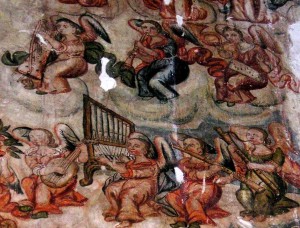Reviews
“This engaging book is a welcome contribution to Andean history, colonial urban history and the social history of music generally. . . . Baker has made excellent use of the departmental and episcopal archives to provide a richly detailed discussion of music makers and listeners, and the role music played in daily and public life.” — David T. Garrett, Journal of Latin American Studies
“Geoffrey Baker’s Imposing Harmony: Music and Society in Colonial Cuzco is an outstanding contribution to both Andean studies and colonial musicology, and it should be read by anyone with an interest in either field.“ — Joshua Tucker, Latin American Music Review
“This is an excellent book that discusses critical issues central to our understanding of colonial music and society in an original manner and whose approach, spread over various disciplines, significantly widens the perspectives of the studies published to date. [Baker’s] reconsideration of traditional methods and sources and his open invitation to create a distinctively Latin American historical musicology less dependent on European models represent a considerable challenge for scholars of music in the New World.” — Javier Marín-López, Early Music History
“This book is an invaluable addition to the study of Latin America and should be a fine companion for undergraduate and graduate music research.” — Matthew J. Forss, Canadian Journal of History
“Imposing Harmony offers considerable inroads for understanding the music profession and its social contexts in a viceregal city and conquered imperial capital. . . . I found the real value in Baker’s book not in the idea that there was a rich musical culture throughout the city — that is obvious just by looking at the surviving church architecture — but rather that the indigenous Andeans had their own reasons for participating in European style musical cultures. This should help scholars rethink their exoticist approaches to music and race in the viceregal Americas and remember not to collapse indigenous peoples into a single monolithic social class. Baker reminds us to recognize the many different ways in which indigenous peoples negotiated cultural practices in a mature viceregal society, including the propagation of European musics.” — Drew Edward Davies, VoiceXChange
“This book makes an outstanding contribution to the music history of colonial Latin America from a perspective – urban and social – that in the Hispanic world has not received the attention it deserves. . . . Baker’s agile prose presents a vivid narrative of interest to both musicologists and historians, placing Cuzco on the map of Spanish and Latin American music history during the Modern Age.” — María Gembero, Hispanic American Historical Review
“Thoroughly researched, theoretically informed, and clearly written, this book is a worthy addition to the historiography of Latin American music.” — John Charles Chasteen, American Historical Review
“What we learn in the end from Baker’s book is not only the richness of colonial Cuzco’s musical scene but also how little we know about most other cities in Latin America during their long, complex colonial eras and, more surprisingly, most cities in Spain. . . . His book demonstrates that research on colonial music benefits from many trends in research, just as we all benefit from going back to the archives — not just the local cathedral — with a long list of new questions. I hope Baker’s work will inspire many authors who will produce similar studies on other cities.” — Grayson Wagstaff, Journal of the American Musicological Society
“[A] work that gives great insight into the musical culture of a mature colonial, but largely indigenous, city. Imposing Harmony focuses on seventeenth- and eighteenth-century musical practices in Cuzco, illuminating the role of music in shaping urban experiences, particularly the experiences of those involved in music-making.” — Kristin Dutcher Mann, Ethnohistory
“Although seemingly narrow in focus — and this is not a negative, for Baker presents in fascinating detail the soundscape of colonial Cuzco — the book shows how music was a vehicle for the expression and development of Christianity among indigenous nobles. . . . Baker uses painstaking archival work and a talent for reading the often-frustrating silences therein to show how Spaniards mobilized sacred architecture and music to subdue and awe the native population, and to transform Cuzco from the ceremonial site of the Incas into a bastion of Catholicism, making it an ideal Spanish city.” — Stephanie Kirk, Latin American Research Review
“Clearly written throughout, Imposing Harmony is eminently comprehensible for both music students and non-music specialists. The volume is well laid-out, making it easy to navigate between chapters and endnotes. Sixteen images add an important visual dimension to the argument. . . . [T]his book will be a valuable addition to Latin Americanists’ collections, as well as to university courses with an emphasis on Latin American music or research methodologies.” — Cristina Cruz-Uribe, A Contracorriente
“Geoffrey Baker presents a profound analysis of the fascinating way in which old polyphony made its entry into the New World. Written in a very lively and eloquent style, it is a great read, also for someone who is not a historian and was not even aware of urban musicology as subdiscipline. . . . There are few occasions in which I have read a scholarly book with so much joy.” — Barbara Hogenboom, European Review of Latin American and Caribbean Studies
